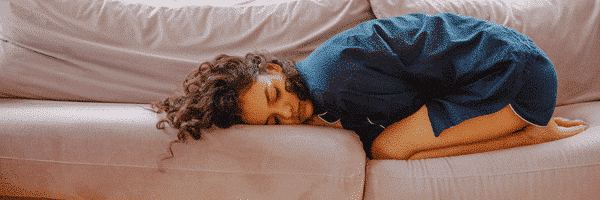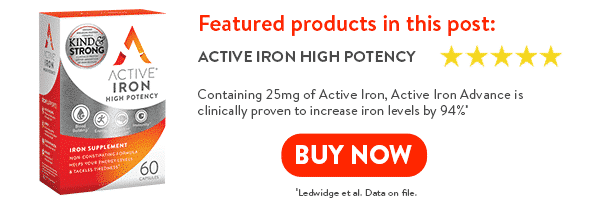TIREDNESS AFTER YOUR PERIOD.

The days leading up to a woman’s period marks a significant moment of change in the body. Many women being to feel symptoms of PMS (Premenstrual Syndrome) during this time, and one of the most common symptoms is period fatigue. In this article, we will answer some of the biggest questions around feeling tired before your period, including the following:
- How common is period fatigue?
- Fatigue before your period explained
- How to deal with menstruation fatigue
- When to see a doctor
- Manage period fatigue by taking an iron supplement
How common is period fatigue?
It is completely normal to feel tired and fatigued in the days before your period. In fact, Active Iron surveyed over 2,000 women in Ireland and the UK,¹ and found found that 64% reported tiredness and fatigue as one of their top period symptoms. Alongside tiredness, women also ranked pain, mood changes, and bloating as their most frequent complaints during menstruation.
Menstrual fatigue severity can vary, and some women may find it difficult to sleep well at night, or focus on tasks throughout the day. Symptoms like fatigue can start a week before one’s period, although some women may experience it even earlier. Those with heavier periods are at an increased risk for fatigue before periods, and may wish to seek advice from healthcare professionals.
It can feel like an uphill battle just to get going each day, but there are some home remedies that help improve energy levels throughout the menstrual cycle.

Period fatigue explained
Period fatigue is usually understood as being a symptom of PMS, linked to the change in hormone levels at the start of the menstrual cycle. There are several key factors involved in period fatigue:
- Hormonal changes
- Not sleeping enough
- Stress
- Depression
- Unhealthy dietary habits
- Dehydration
- Low iron
- Chronic disorders such as diabetes, heart disease, etc
Researchers believe that a decrease in estrogen levels causes a subsequent decrease in serotonin levels, the combination of which can lead to low energy and fatigue in the week before one’s period. Lack of sleep caused by PMS can also affect menstrual fatigue. A woman’s body temperature actually increases in the days before menstruation, which can make it more difficult to sleep, affecting energy levels the next day.
Of the women surveyed, 46% reported menstrual fatigue for 1-3 days in their cycle, and 36% said their symptoms of period fatigue lasted up to six days.
How to deal with menstruation fatigue
Feeling fatigue before your period is normal, but the good news is that help is out there. Follow our nine tips for relieving period symptoms including fatigue here, and take a look at the following:
Eat a healthy, balanced diet
You are what you eat, and ensuring your body has the right proteins and nutrients during menstruation can help ease symptoms like period fatigue. It’s tempting to reach for a bar of chocolate and curl up on the couch, but foods high in sugar only cause energy crashes after the high wears off. Drink plenty of water and focus on eating more fruits, vegetables, and wholegrains.

Take an iron supplement
Did you know that menstruation is the leading cause of iron loss worldwide? Blood loss from periods can cause low iron levels, and iron is responsible for red blood cell and energy production in the body. Taking an iron supplement such as Active Iron consistently throughout your cycle can help increase your iron and energy levels, helping you to feel more energised and alert.
Exercise
It may seem counter-intuitive to move your body more when you’re feeling less energised, but even small amounts of daily exercise is shown to boost your energy levels. Exercise releases endorphins, which naturally boost your energy levels, and can also help with other PMS symptoms. If you’re not good at getting yourself to the gym, consider enlisting a friend to join you for regular walks around the neighborhood. It will help motivate you, and keep you adhering to a consistent schedule!
Drink more water
Staying hydrated is good advice for most of life’s problems, but dehydration is especially notorious for causing low energy levels. Going to bed dehydrated can impact your sleep schedule, leading to dry mouth and nasal passages, snoring, and cramps. Keep a full water bottle on your bedside table and remember to sip throughout the day, too!
Give yourself the time to relax
Life is a whirlwind, and sometimes we don’t allow ourselves, or simply don’t have the time, to relax. 60% of women surveyed about their menstrual symptoms said that finding the time to rest and relax significantly improved their quality of life during their period. However you can make it possible, building a little extra “you” time into your schedule can help combat fatigue before periods.

When to see a doctor
For most women, fatigue before menstruation is completely normal, and not a cause for alarm. However, if you find that you are experiencing severe fatigue, coupled with other symptoms like intense sadness, irritability, or uncontrollable emotional swings, you may be exhibiting signs of PMDD, or Premenstrual Dysphoric Disorder. This is a more extreme form of PMS, and requires treatment. Check with your doctor if you feel that your period fatigue goes beyond the acceptable norm.
Manage period fatigue by taking an iron supplement
Women can lose up to 250mg of iron during her menstrual cycle, and iron plays a key role in supporting a healthy immune system, maintaining energy levels, and transporting oxygen via red blood cells. Taking an iron supplement, such as Active Iron, is a great way to address low iron levels throughout menstruation, and help keep pre-period fatigue at bay. 64% of women surveyed said that they experienced menstrual tiredness and fatigue during their cycle, so keeping iron levels up can prove a significant boost to energy.
Knowing which iron supplement to rely on can be tricky, as they vary in strength and efficacy. Active Iron is clinically proven to be better absorbed than other iron supplements,² meaning it increases iron levels and helps avoids the gastrointestinal side effects usually associated with iron supplements.³
Active Iron High Potency delivers 25mg of iron in each one-a-day capsule, a great option for those who experience low iron levels on a regular basis. Active Iron for Women also offers 25mg of iron, alongside a multivitamin specially formulated with women’s health in mind.
¹Survey conducted by Active Iron and 3Gem with 2,400 women in Ireland and the UK
²Wang et al. 2017, Acta Haematological, 138: 223-232
³Ledwidge et al. Data on file.



